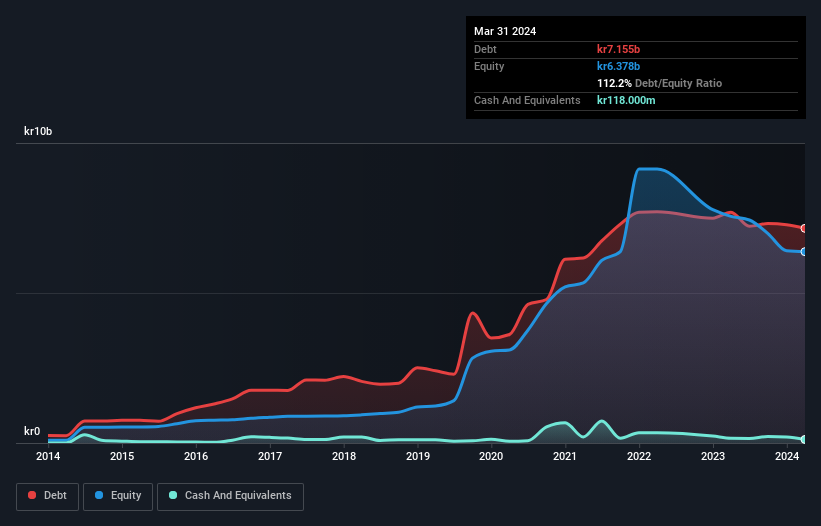Legendary fund manager Li Lu (who Charlie Munger backed) once said, 'The biggest investment risk is not the volatility of prices, but whether you will suffer a permanent loss of capital.' So it seems the smart money knows that debt - which is usually involved in bankruptcies - is a very important factor, when you assess how risky a company is. Importantly, Neobo Fastigheter AB (publ) (STO:NEOBO) does carry debt. But the real question is whether this debt is making the company risky.
What Risk Does Debt Bring?
Debt assists a business until the business has trouble paying it off, either with new capital or with free cash flow. Part and parcel of capitalism is the process of 'creative destruction' where failed businesses are mercilessly liquidated by their bankers. However, a more frequent (but still costly) occurrence is where a company must issue shares at bargain-basement prices, permanently diluting shareholders, just to shore up its balance sheet. Of course, debt can be an important tool in businesses, particularly capital heavy businesses. When we think about a company's use of debt, we first look at cash and debt together.
Check out our latest analysis for Neobo Fastigheter
How Much Debt Does Neobo Fastigheter Carry?
The image below, which you can click on for greater detail, shows that Neobo Fastigheter had debt of kr7.16b at the end of March 2024, a reduction from kr7.69b over a year. And it doesn't have much cash, so its net debt is about the same.

How Healthy Is Neobo Fastigheter's Balance Sheet?
We can see from the most recent balance sheet that Neobo Fastigheter had liabilities of kr477.0m falling due within a year, and liabilities of kr7.33b due beyond that. Offsetting these obligations, it had cash of kr118.0m as well as receivables valued at kr82.0m due within 12 months. So its liabilities outweigh the sum of its cash and (near-term) receivables by kr7.61b.
This deficit casts a shadow over the kr2.85b company, like a colossus towering over mere mortals. So we'd watch its balance sheet closely, without a doubt. After all, Neobo Fastigheter would likely require a major re-capitalisation if it had to pay its creditors today.
We measure a company's debt load relative to its earnings power by looking at its net debt divided by its earnings before interest, tax, depreciation, and amortization (EBITDA) and by calculating how easily its earnings before interest and tax (EBIT) cover its interest expense (interest cover). This way, we consider both the absolute quantum of the debt, as well as the interest rates paid on it.
Weak interest cover of 0.79 times and a disturbingly high net debt to EBITDA ratio of 19.7 hit our confidence in Neobo Fastigheter like a one-two punch to the gut. This means we'd consider it to have a heavy debt load. Fortunately, Neobo Fastigheter grew its EBIT by 8.8% in the last year, slowly shrinking its debt relative to earnings. There's no doubt that we learn most about debt from the balance sheet. But you can't view debt in total isolation; since Neobo Fastigheter will need earnings to service that debt. So when considering debt, it's definitely worth looking at the earnings trend. Click here for an interactive snapshot.
Finally, while the tax-man may adore accounting profits, lenders only accept cold hard cash. So the logical step is to look at the proportion of that EBIT that is matched by actual free cash flow. Over the most recent three years, Neobo Fastigheter recorded free cash flow worth 77% of its EBIT, which is around normal, given free cash flow excludes interest and tax. This free cash flow puts the company in a good position to pay down debt, when appropriate.
Our View
On the face of it, Neobo Fastigheter's interest cover left us tentative about the stock, and its level of total liabilities was no more enticing than the one empty restaurant on the busiest night of the year. But at least it's pretty decent at converting EBIT to free cash flow; that's encouraging. Looking at the bigger picture, it seems clear to us that Neobo Fastigheter's use of debt is creating risks for the company. If everything goes well that may pay off but the downside of this debt is a greater risk of permanent losses. The balance sheet is clearly the area to focus on when you are analysing debt. However, not all investment risk resides within the balance sheet - far from it. Case in point: We've spotted 2 warning signs for Neobo Fastigheter you should be aware of.
If you're interested in investing in businesses that can grow profits without the burden of debt, then check out this free list of growing businesses that have net cash on the balance sheet.
Valuation is complex, but we're here to simplify it.
Discover if Neobo Fastigheter might be undervalued or overvalued with our detailed analysis, featuring fair value estimates, potential risks, dividends, insider trades, and its financial condition.
Access Free AnalysisHave feedback on this article? Concerned about the content? Get in touch with us directly. Alternatively, email editorial-team (at) simplywallst.com.
This article by Simply Wall St is general in nature. We provide commentary based on historical data and analyst forecasts only using an unbiased methodology and our articles are not intended to be financial advice. It does not constitute a recommendation to buy or sell any stock, and does not take account of your objectives, or your financial situation. We aim to bring you long-term focused analysis driven by fundamental data. Note that our analysis may not factor in the latest price-sensitive company announcements or qualitative material. Simply Wall St has no position in any stocks mentioned.
Have feedback on this article? Concerned about the content? Get in touch with us directly. Alternatively, email editorial-team@simplywallst.com
About OM:NEOBO
Neobo Fastigheter
Operates as a real estate company that owns, manages, and refines rental residential properties in Sweden.
Low risk with poor track record.
Similar Companies
Market Insights
Community Narratives



